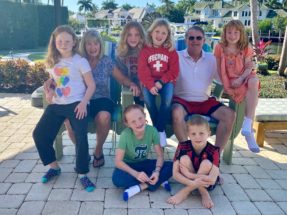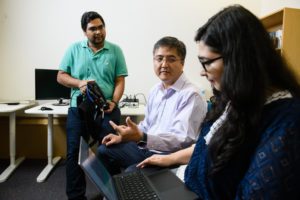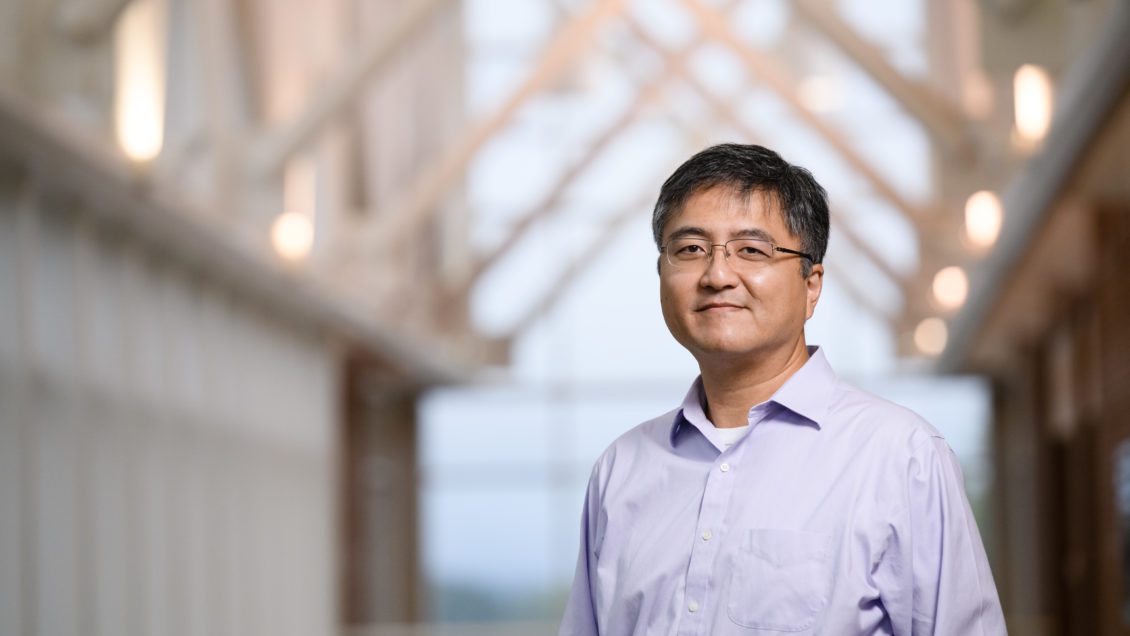K.C. Wang said that his new position as the C. Tycho Howle Chair of Collaborative Computing Environments will help him encourage convergence research and put Clemson University on the map as one of the co-inventors of a new internet and the many applications it will enable.
As part of the position, Wang will lead the Clemson research cluster focused on artificial intelligence, cyber, sensing, analytics and autonomy. The idea is to bring together researchers from different disciplines to work on the same projects, enhancing their ability to help solve some of the world’s toughest challenges, a concept called convergence research.

“I’m very happy,” Wang said. “Collaborative computing has been my focus for more than a decade, and I believe that is the answer to most of the important problems the world is facing now. We have to be collaborating, and this position really comes at a time that can help me really step up the game and bring in more collaborators to work together.”
Endowed chairs are among the most highly esteemed positions on Clemson’s faculty and come with endowments whose proceeds are often used to support the holders’ research, students and collaborations.
Howle, the namesake for Wang’s position, is a software and internet pioneer who graduated from Clemson with honors in physics in 1971 and went on to earn a master’s degree in systems engineering in 1973. He later attended Harvard Business School where he received his MBA.
A company Howle co-founded in 1983, Harbinger Computer Services, grew to more than 40,000 active customers, 1,000 employees spread across eight countries and annual revenues exceeding $155 million.
Howle and his wife, Marie, established a foundation in 1996 to share their resources with a number of philanthropic causes, ranging from education and healthcare to the arts and homelessness.
The C. Tycho and Marie Howle Foundation’s $2.5-million gift to Clemson in 2008 established two endowed chairs, the one now held by Wang and one held by Amy Apon, the C. Tycho Howle Director of the School of Computing.
“I look at it as us trying to do good together,” Howle said in an interview at his Atlanta home. “K.C. has a role to play. He has got to make it as impactful of a role as he can. For us to provide some resources for him to be able to do that, that’s a wonderful feeling. You’d like to think that K.C. and Amy are going to be extraordinarily successful in their careers, and we will have helped them along the way. That’s the ideal.”
Clemson President Jim Clements said the Howle family’s gift continues to have an impact 13 years after it was first received.
“Tycho and Marie Howle took a major step in 2008 to ensure that Clemson would have top talent in the field of computing,” Clements said. “We deeply appreciate their forward-thinking generosity and their passion for Clemson. We offer our most sincere thanks.”
Robert Jones, executive vice president for academic affairs and provost, said that Wang is well positioned to make the most of the benefits that come with the endowed chair.
“Dr. Wang is a highly-sought networking researcher and team builder who works effectively across disciplines for maximum impact,” Jones said. “I congratulate him on this well-deserved honor and thank the Howle family for making the endowed chair possible.”
In his new role, Wang will continue collaborative research to help develop a new version of the internet that he and others said will be crucial to enabling next-generation technologies, such as self-driving cars, smart cities and Industry 4.0 advances in manufacturing.
He is the Clemson lead on FABRIC, a $20-million program funded by the National Science Foundation to develop new internet architectures, the technical and organizational structure of the internet.
“We’re actively building it,” Wang said. “Hopefully before I retire, we’re going to see a completely new experience of what the internet is, and Clemson is playing a role in that.”

Among the students studying under Wang are Snigdhaswin Kar and her husband, Prabodh Mishra, who were working at Qualcomm in India when they decided they wanted to expand their knowledge by pursuing doctorate degrees.
“Dr. Wang has very good expertise in the field of networking and computer communication, and he has very interesting projects,” Kar said. “He provides great feedback on our work and has very interesting and novel ideas, which we implement.”
They are following in the footsteps of Howle, who first began using computers early in his career, before co-founding Harbinger. Computers helped him at a research plant where he analyzed synthetic fibers and later at a consultancy where he analyzed court claims.
After receiving his MBA, he knew he wanted to work with personal computers, and he went to work for Hewlett Packard in Oregon. At the time, computers were able to connect to each other through modems, but the internet was in its infancy, used by just a few researchers.
“I said one of these days, that’s going to be important,” Howle said. “You’re going to be able to do it for things like home banking and home shopping. You’re going to be able to go in and order things and have them delivered to your door, all through a personal computer and a telephone line.”
Time would prove him prophetic.
Harbinger became an electronic-commerce leader that linked businesses’ back offices to facilitate trade. Howle stepped down as CEO in 2000, shortly before the company was sold, but the tech world hadn’t seen the last of him.
In 2003, he founded nuBridges, a company that focused on protecting sensitive data. Howle retired in 2008 and turned his attention to serving on a number of nonprofit boards, including the Clemson University Foundation and the Clemson University President’s Advisory Board.
Marie Howle served as the head of the family’s charitable foundation from its launch until the family turned over management to a donor-advised fund about three years ago. She was not surprised in 2008 when her husband wanted to direct some of their funds to Clemson.
“That’s just what he does,” she said. “We’re both appreciative of what we have.”
A joint statement thanking Howle and congratulating Wang was issued by Hai Xiao, chair of the Holcombe Department of Electrical and Computer Engineering, and Anand Gramopadhye, dean of the College of Engineering, Computing and Applied Sciences.
“The Howle family’s gift has helped us ensure that we have top talent in strategically key positions,” they said. “Their generosity is helping us build new research and teaching capabilities in artificial intelligence, cyber, sensing, analytics and autonomy. We offer the Howles our wholehearted gratitude and congratulate K.C. Wang on his new position.”
Get in touch and we will connect you with the author or another expert.
Or email us at news@clemson.edu

